九年级英语Unit 1 How can we become good learners.Section-B 最新(共66张PPT)
文档属性
| 名称 | 九年级英语Unit 1 How can we become good learners.Section-B 最新(共66张PPT) | 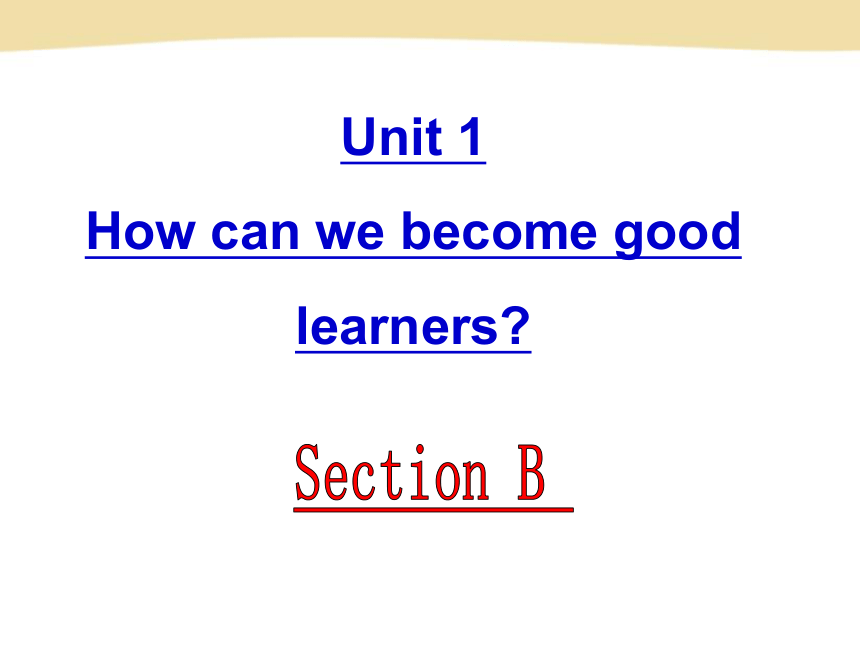 | |
| 格式 | ppt | ||
| 文件大小 | 975.0KB | ||
| 资源类型 | 教案 | ||
| 版本资源 | 人教新目标(Go for it)版 | ||
| 科目 | 英语 | ||
| 更新时间 | 2022-10-05 10:36:33 | ||
图片预览

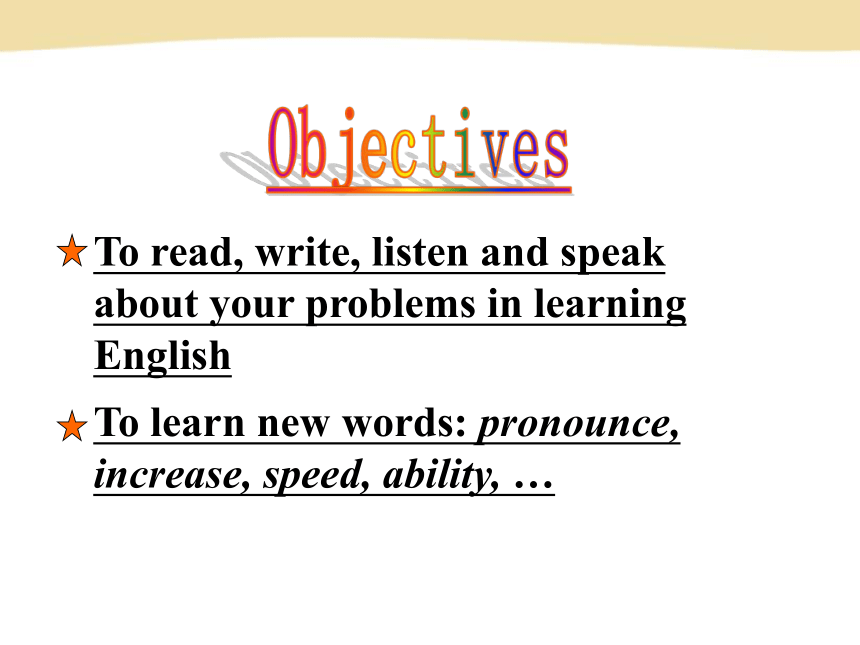
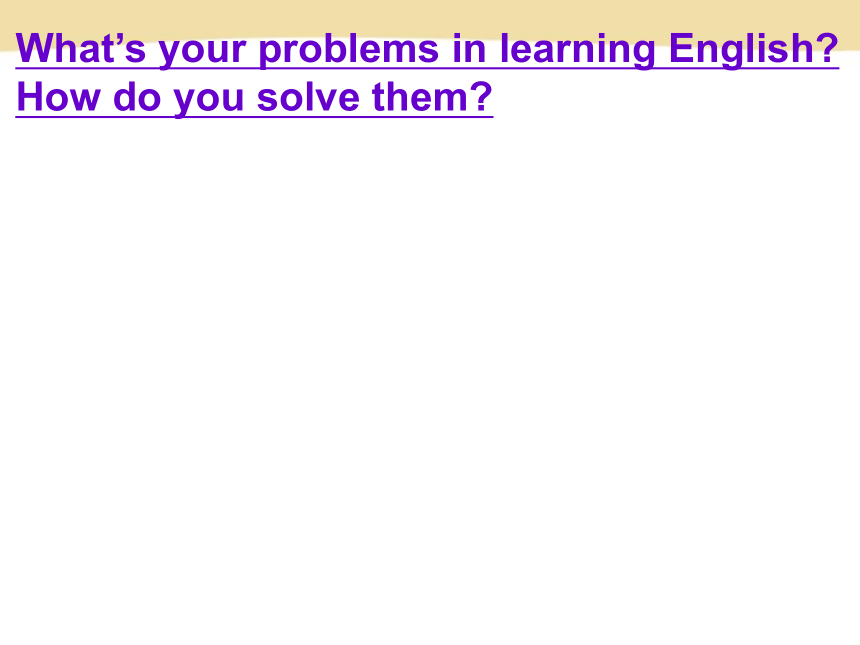
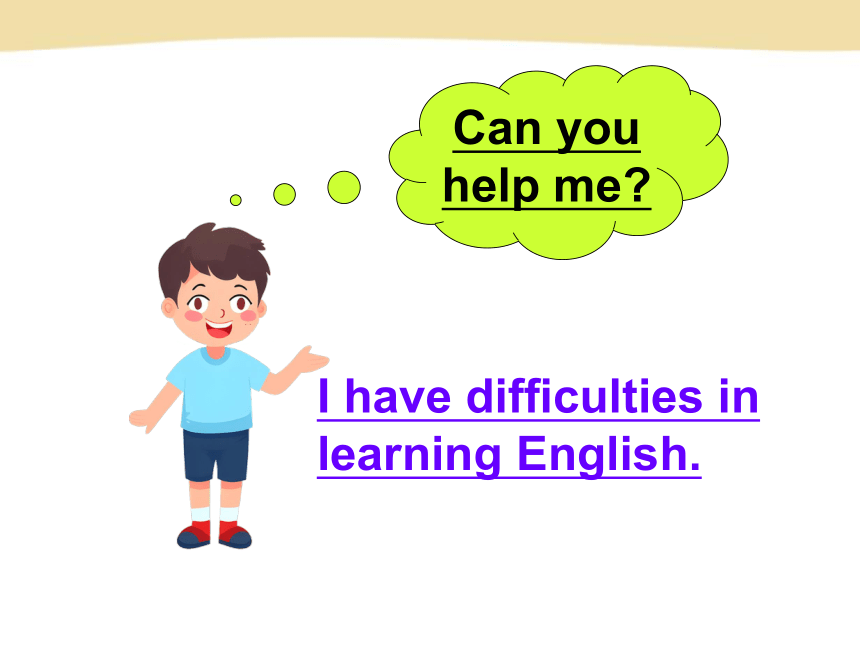
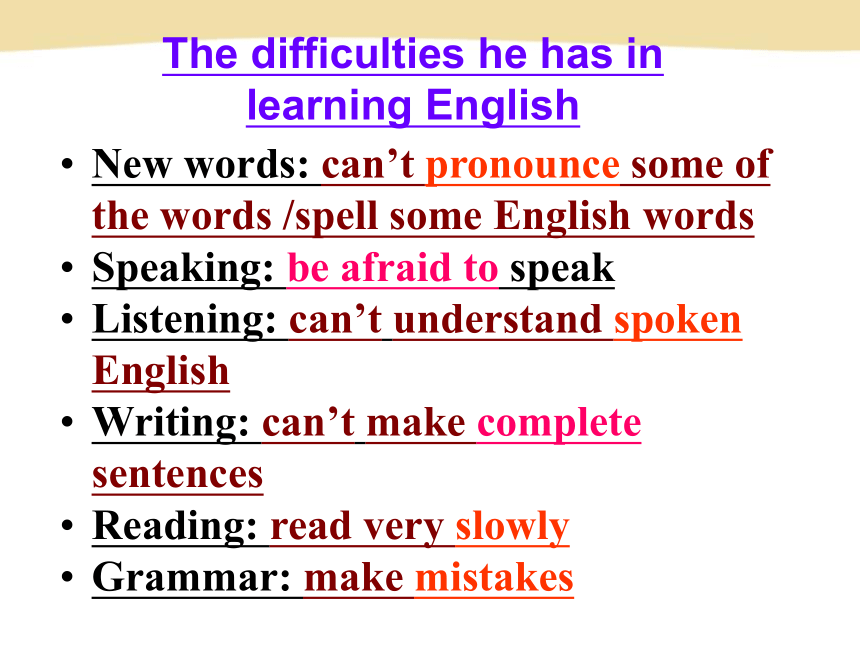
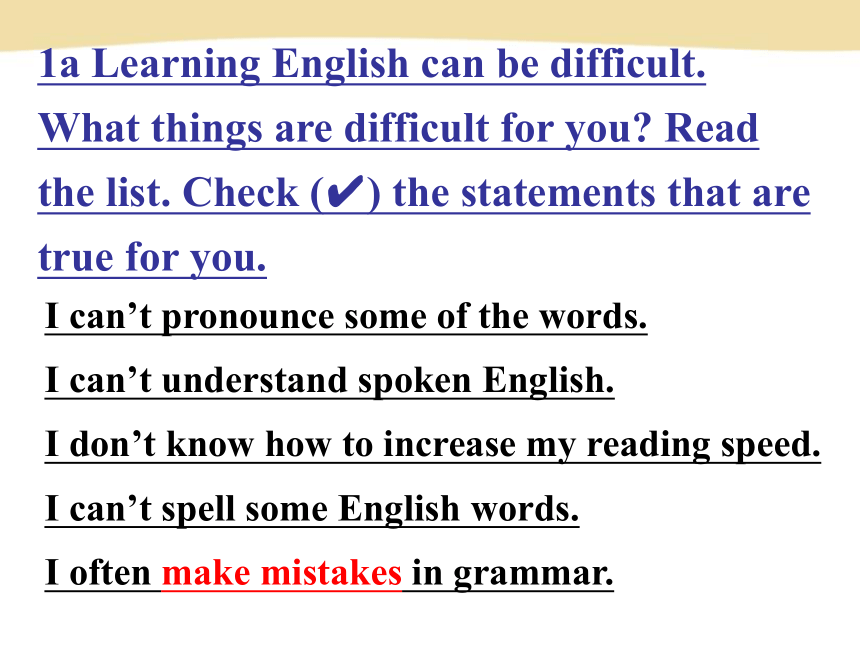
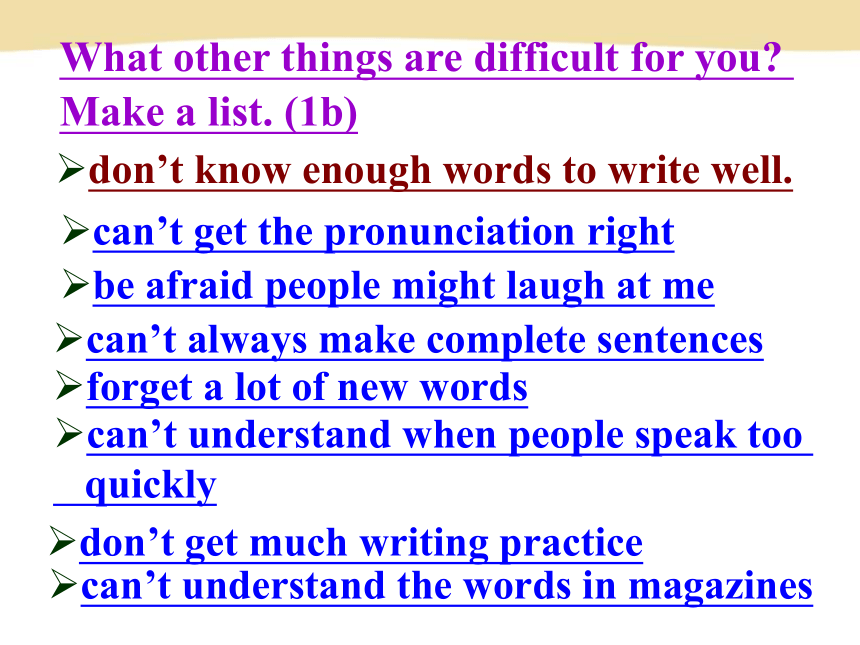
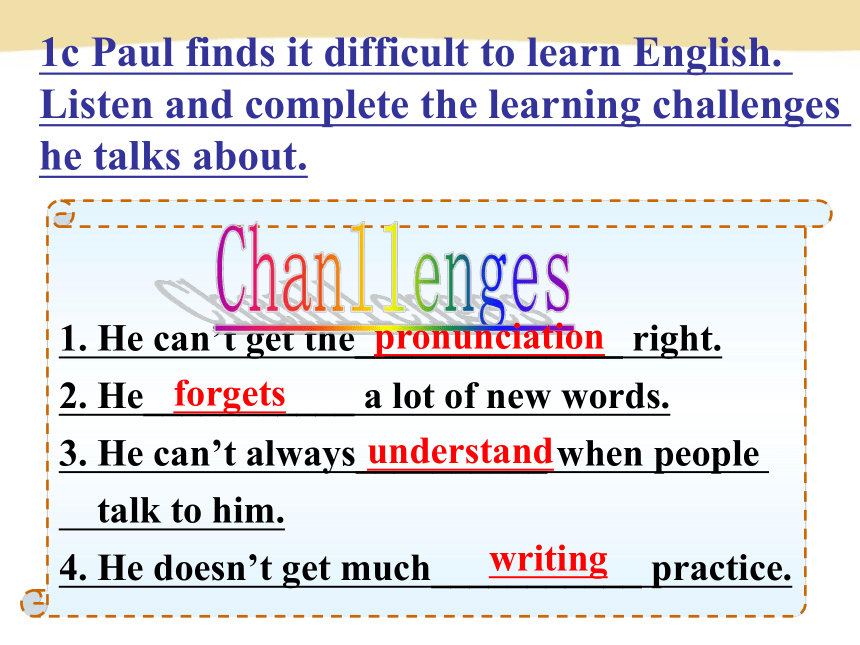
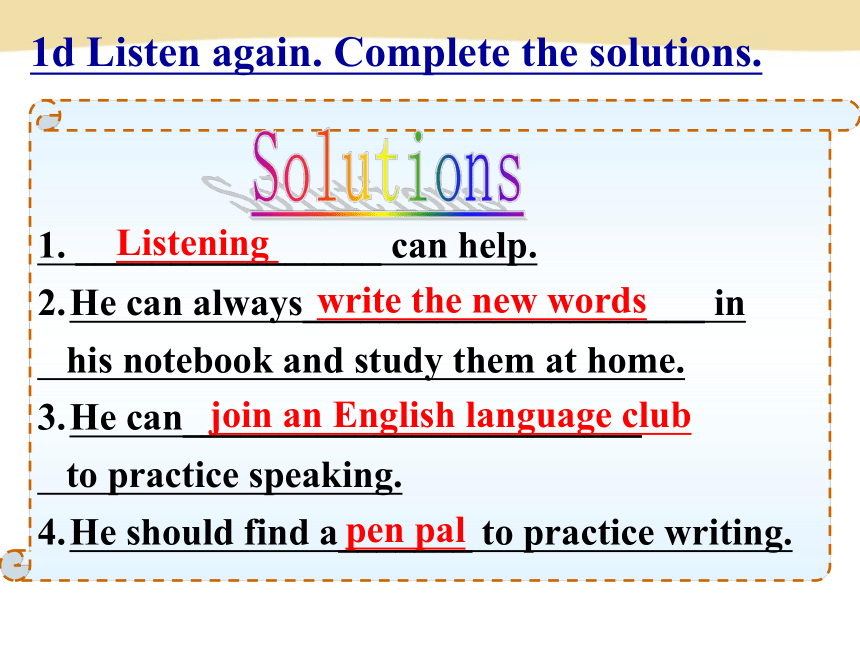
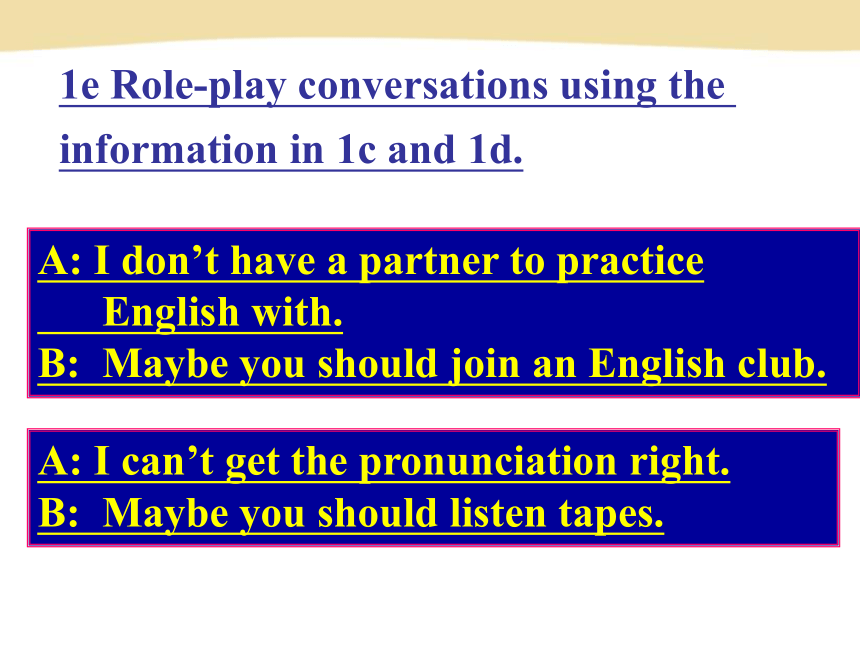
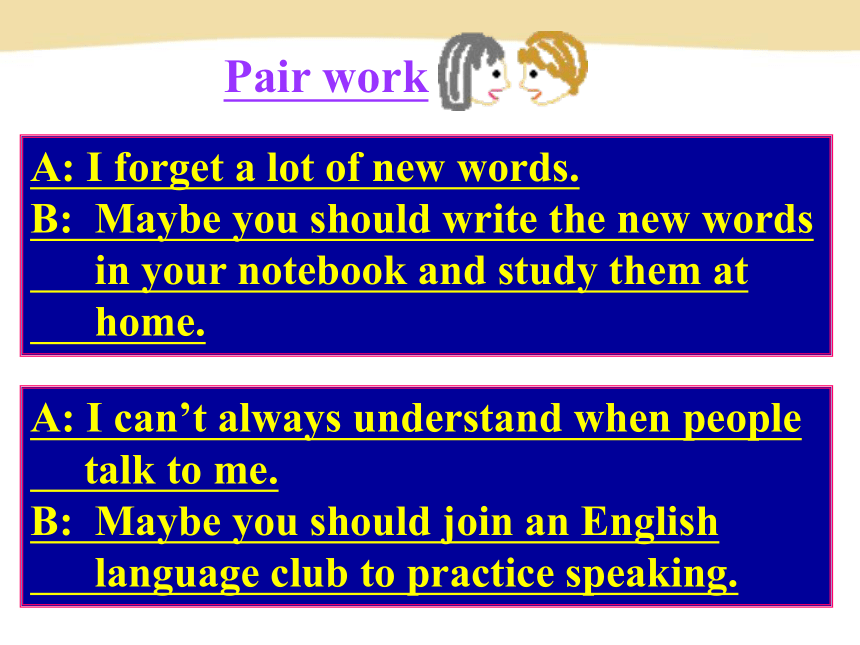
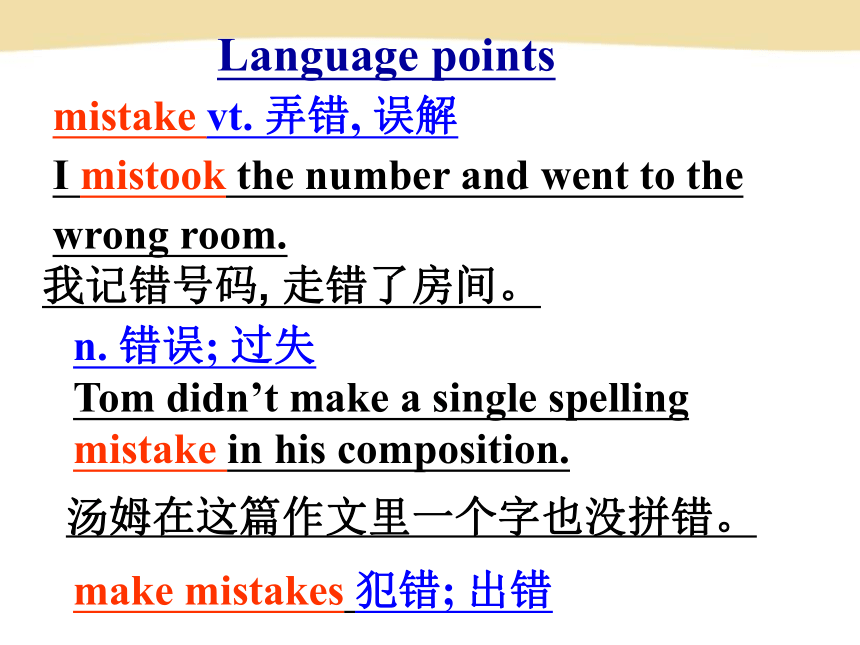
文档简介
(共66张PPT)
Unit 1
How can we become good
learners
To read, write, listen and speak about your problems in learning English
To learn new words: pronounce, increase, speed, ability, …
What’s your problems in learning English
How do you solve them
I have difficulties in
learning English.
Can you help me
The difficulties he has in learning English
New words: can’t pronounce some of the words /spell some English words
Speaking: be afraid to speak
Listening: can’t understand spoken English
Writing: can’t make complete sentences
Reading: read very slowly
Grammar: make mistakes
I can’t pronounce some of the words.
I can’t understand spoken English.
I don’t know how to increase my reading speed.
I can’t spell some English words.
I often make mistakes in grammar.
1a Learning English can be difficult. What things are difficult for you Read the list. Check ( ) the statements that are true for you.
don’t know enough words to write well.
can’t get the pronunciation right
be afraid people might laugh at me
can’t always make complete sentences
forget a lot of new words
can’t understand when people speak too
quickly
don’t get much writing practice
can’t understand the words in magazines
What other things are difficult for you
Make a list. (1b)
1c Paul finds it difficult to learn English.
Listen and complete the learning challenges
he talks about.
1. He can’t get the______________ right.
2. He___________ a lot of new words.
3. He can’t always__________ when people
talk to him.
4. He doesn’t get much___________ practice.
pronunciation
forgets
understand
writing
1d Listen again. Complete the solutions.
1. ________________ can help.
He can always_____________________ in
his notebook and study them at home.
He can________________________
to practice speaking.
He should find a_______ to practice writing.
Listening
write the new words
join an English language club
pen pal
1e Role-play conversations using the
information in 1c and 1d.
A: I don’t have a partner to practice
English with.
B: Maybe you should join an English club.
A: I can’t get the pronunciation right.
B: Maybe you should listen tapes.
A: I can’t always understand when people
talk to me.
B: Maybe you should join an English
language club to practice speaking.
A: I forget a lot of new words.
B: Maybe you should write the new words
in your notebook and study them at
home.
Pair work
mistake vt. 弄错, 误解
I mistook the number and went to the wrong room.
Language points
我记错号码, 走错了房间。
汤姆在这篇作文里一个字也没拼错。
make mistakes 犯错; 出错
n. 错误; 过失
Tom didn’t make a single spelling mistake in his composition.
challenge n. 挑战
He wants a career that offers a challenge.
vt. 向......挑战; 对......提出异议
I challenged him to show his proof.
他就我对那件事的看法提出异议。
我要他拿出证据。
他想要一份有挑战性的事业。
He challenged my view on that matter.
solution n. (问题、疑难等的) 解决; 解答
也许要花很长时间才能找到解决这个问题的办法。
It may take a long time to find a solution
to the problem.
解决这个问题需要很多时间。
The solution of the problem requires a lot
of time.
2a What good learning habits can you think of Make a list and discuss them with your partner.
2b Read the passage quickly and check if any of the habits you listed in 2a are mentioned. Which four habits of successful learners can you find from the passage
USING DICTIONARIES
This can help you find the definition that matches the context of the word in the text.
How Can You Become a Successful Learner
Everyone is born with the ability to learn.
But whether or not you can do this well depends on your learning habits. Research
shows that successful learners have some good habits in common.
Creating an interest in what they learn
Studies show that if you are interested in something, your brain is more active and
it is also easier for you to pay attention to it for a long time. Good learners often connect what they need to learn with something interesting. For example, if they need to learn English and they like music or sports, they can listen to English songs or watch sports programs in English. This way they will not get bored.
Practicing and learning from mistakes
Good learners think about what they are good
at and what they need to practice more. Remember, “use it or lose it”! Even if you learn something well, you will forget it unless you use it. “Practice makes perfect.” Good learners will keep practicing what they have learned, and they are not afraid of making mistakes. Alexander Graham Bell did not invent the telephone overnight. He succeeded by trying many times and learning from his mistakes.
Developing their study skills
It is not enough to just study hard. Good learners know the best ways they can study. For example, they may take notes by writing down key words or by drawing mind maps. They also look for ways to review what they have learned. They may do this by reading their notes every day or by explaining the information to another student.
Asking questions
Good learners often ask questions during or
after class. They even ask each other and try to find out the answers. Knowledge comes from questioning.
Learning is a lifelong journey
because every day brings
something new. Everything thatyou learn becomes a part of you
and changes you, so learn wisely
and learn well.
2c Read the passage again and answer the questions.
Does the writer think that everyone is born
with the ability to learn well Do you agree
Why or why not
No. No, I don’t. Because whether or not you
can learn well depends on your learning habits.
2. Why is it a good idea to connect something
you need to learn with something you are
interested in
Because if you are interested something, your
Brain is more active and it is also easier for
You to pay attention to it for a long time.
3. What do the sayings “use it or lose it” and
“practice makes perfect” mean Do you
agree with them
We should keep practicing what we have learned. Even if we learn something well, we will forget it until we use it. Yes, I do.
4. Do good learners learn from mistakes or
are they afraid of making mistakes
Good learners learn from mistakes.
6. Do you agree that learning is a lifelong
journey Why or why not
5. What study skills does the writer talk
about Do you have those study skills
Creating an interest in what you learn, practicing and leaning from mistakes, developing study skills and asking questions. Yes, I do./ No, I don’t.
Yes, I do. Because every day brings something new.
2d Look up the following words from the
passage in the dictionary. Then write a sentence for each word.
brain n. connect v. overnight adv.
attention n. review v. knowledge n.
ability n. active adj. wisely adv.
e.g. brain: A good way to train the brain is to
do some math exercises every day.
2e Do you think you are a good learner What learning habits do you think are useful Discuss with your group and share your ideas with the class.
Can you think of other ways to become a successful learner Discuss with your group and share your ideas with the class.
A: I think another way to become a successful
learner is by trying to think about the
same thing in different ways.
B: I agree. I believe that ...
Language Points
1. Everyone is born with the ability to learn.
But whether or not you can do this well
depends on your learning habits.
Be born 意为“天生,出生”为被动语态, be 动词通常用was 或were,born 为bear 的过去分词。E.g. I was born in a small village.
我出生在一个小山村。
He was born to succeed in life.
他生来注定会成功。
(2) ability 在此处为不可数名词,意为“能力”常构成短语 have the ability to do sth. ( 有能力做某事), 而不用 “have the ability of doing sth” 结构。
Man has the ability to speak.
人类有说话的能力。
(3) whether or not 意为“是否” whether引导主语从句,不能与if 替换。
Whether she will come or not is still a problem. 她是否会来还是个问题。
(4) depend on 意为“ 视……而定,取决于;依靠;依赖 。后接名词,代词或动名词。既不能用于进行时态也不能用于被动语态。
Does the quality of teaching depend on the class size.
You may depend on his coming.
教学质量取决于每个班级的人数吗?
你可以相信他会来。
2. Studies show that if you are interested in something, your brain is more active and it is also easier for you to pay attention to it for a long time.
Active –adj, “活跃的,积极的” 可作表语
或定语。常用短语:take an active part in,
意为“积极参加”
他虽然年过八十,但是仍很活跃。
Although he is over 80, he is still very active.
We all take a part in the sports meeting.
我们都积极参加运动会。
(2) pay attention to 意为“注意,关注”,其中to 为介词,其后可接名词、代词或动词-ing形式。
You’d better pay attention to this word in the
English exam last time.
你最好注意一下上次英语考试中的这个单词。
3. Good learners often connect what they need to learn with something they are interested in.
(1) connect…with…意为“ 把……和……联系起来” 其中connect为及物动词,意为“(使)
连接;与…有联系”,其名词形式为connection,意为“连接;关系”
Please don’t connect this person with that person. 请不要把这个人和那个人联系在一起。
(2) need 在此处为及物动词,意为“需要” 其后跟名词、代词、动词不定式或动词-ing形式。need作实义动词时,既可用于肯定句,也可用于否定句和疑问句,构成否定和疑问句时要借助助动词do/ does/ did.
I need a lot of money now.
我现在很需要钱。
You need to take good care of your mother.
你要好好照顾你妈妈。
4. Good learners think about what they are good at and what they need to practice more.
Think about 意为“考虑”其后接名词、代词、动词-ing形式或宾语从句。
They are thinking about a serious problem.
他们正在考虑一个严肃的问题。
(2) Be good at “擅长” 同义于 do well in “在某方面做得好”
He is good at English.= he does well in English.
5. Even if you learn something well, you will forget it unless you use it.
(1)Even if 意为“即使,尽管”,用于引导让步状语从句,有退一步设想的意味,同义于“even though”
I’ll help you, even if I must stay up the whole night. 即使熬夜一整晚我也要帮助你。
(2) forget 后直接跟名词、代词、动词不定式或动词-ing形式,但两者意义完全不同。
Forget to do sth 和forget doing sth.
Forget to do sth: 忘记去做某事
forget doing sth. 忘记做过某事
e.g. I forget to turn off the light.
我忘记关灯了。
I forget turning off the light.
我忘记已经关灯了。
6. They also look for ways to review what they have learned.
(1)look for 意为“寻找” 后跟名词或代词作宾语。
E.g. They are looking for the missing child.
他们在寻找失踪的孩子。
比较:look for, find与 find out
look for: 寻找,强调寻找的动作和过程,是
有目的的寻找。
find: 找到,发现,通常指找到或发现具体的东西,也可指偶然发现某物或某种情况,强调结果。
find out: 弄清,查明,多指通过调查、询问、研究后搞清楚、弄明白,含经过困难、曲折的意味。
【创新写作】
3b. Write a letter to your friend. Give him/her some advice about the best ways to learn English. Use your notes in 3a.
Best ways to learn Reasons Examples
1. Being interested
in what you do If you are interested in something, your brain will be more active and. . . If you like music, you can learn English by listening to English songs.
Best ways to learn Reasons Examples
2. Developing
study skills It’s not enough to just study hard.
You should know the best way you can study. You can take notes by writing down key words
or by drawing a mind map.
3. Practicing Practice makes
perfect. Keep practicing
what you’ve
learned.
Use the following expressions to help you:
There are three good ways to. . .
I think you should. . .
If you do this, you will. . .
It is also a good idea to. . . because. . .
You could try to improve your English by. . .
This will help you to. . .
【思路点拨】
(1)体裁: 应用文。
(2)人称: 第二人称。
(3)时态: 一般现在时和一般将来时。
【写作模板】
【妙笔成篇】
Dear Li Ming,
____________________________________________________
____________________________________________________
____________________________________________________
Yours,
Mary
【参考范文】
Dear Li Ming,
I know you want to improve your English and you need some help. There are three good ways to learn English.
I think you should be interested in learning English first. If you do this, your brain will be more active and it’s also easier for you to pay attention to it for a long time. You can connect learning English with something interesting. For example, if you like music or movies, you can listen to English songs or watch English-language movies.
It is also a good idea to develop your study skills because it’s not enough to just study hard. You should find the best way you can study. For example, you can take notes by writing down key words or by drawing a mind map. You could try to improve your English by practicing more. This will help you improve your English listening, speaking, writing and so on. Remember, “Practice makes perfect. ”You should keep practicing what you’ve learned and you shouldn’t be afraid of making mistakes. No one can succeed overnight.
I hope all these will be helpful to you.
Yours,
Mary
Write a letter telling a friend
how to be a good learner.
Dear Li Lei,
I know it isn’t easy to learn English well, but I have some ideas that may help. You said you couldn’t understand people who talked fast. Well, you can try to listen for the most important words, not every word.
Sample writing
You can also do lots of listening practice.
I think it’s one of the secrets to becoming
a good learner. Another thing that I think
important is English grammar. In order
to learn it well, you have to take a lot of
grammar notes in every class. You can
write English sentences using the
grammar you are learning. You can
also read more English books. Reading is as important as listening for us to learn English well. If you do so, I believe that you can learn English very well later on.
Yours,
Meimei
根据提示内容写一篇题为“ How to be a good
learner” 的作文。要求:
必须用上提示内容,语句通顺,书写规范。
词数80左右。
提示:habit, way; get ready, listen;
go over, homework; study in groups, help each
other; work hard, do sports…
How to be a good learner
As a good leaner, we should have good
habits and ways of learning. We need to get
ready for our lessons before class and always
listen carefully in class. After class, we must go
over the lessons and finish our homework on
time. It’s good to study in groups and help each
other. As a student, working hard is important
but don’t forget to do sports and keep healthy.
We should do more reading in our free time. If we have any problems, we’d better ask others for help.
I hope all these will be helpful to us.
自我练习
We should read aloud to practice our
p_____________.
As teachers, we must be p_______ with
our students.
3. He is careless, so he always makes many
m________ in his homework.
4. Listening to the teacher carefully is the
s_______ to becoming a good language learner.
5. I’ve learned a lot of k__________ from
his report.
根据句意及首字母提示完成单词。
ronunciation
atient
istakes
ecret
nowledge
1. Are you _______ (害怕的) of snakes
2. My teacher reads the article _________
(慢慢地).
3. He _________ (意识到) he had left his
bag at home.
4. We should help the people in
_________ (困难).
5. My mother doesn’t know our ________
(秘密) plan.
根据汉语提示完成单词。
afraid
slowly
trouble
realized
secret
从方框中选择适当的词汇完成句子。
spoken, difficult, quickly, favorite
It’s very _________ to work out this
problem.
2. This girl can’t understand _________
English.
3. My father spoke very _________, so I
couldn’t hear him clearly.
4. What’s your ________ way to learn math
difficult
spoken
quickly
favorite
根据汉语提示完成句子,每空一词。
1. 我姐姐从不犯语法错误。
My sister has never ______ _________
___ __________.
2. 上周琳达加入了语言俱乐部。
Last week Linda ______ the _________
_____.
3. 他哥哥总是在家里学习新单词。
His brother always ______ ____ _______
___ ______.
at home
made mistakes
in grammar
joined
club
language
studies new words
Translate and write them down.
令我吃惊的是,我发现自己和这个陌生人之间有很多共同之处。
2. 天气若不很冷,我总是开着窗户睡觉。
To my surprise, I found I had a lot in
common with this stranger.
I sleep with the window open unless
it’s really cold.
3. 你能依靠她来应付(deal with)这种局面。
4. 请注意你的字迹。
5. 他对小说(fiction)感兴趣。
You can depend upon her to deal
with this situation.
Please pay attention to your handwriting.
He was interested in fictions.
You can improve your English _______ practicing more.
A. by B. with C. of D. in
Linda’s father hates waiting in long lines. I think he’s just not very_____.
A. patient B. talented
C. popular D. powerful
A
A
—Tommy, you can never let others know what I have told you today.
—Don’t worry. I will keep the ______
secret B. money
C. address D. grade
You don’t have to ____every new word in the dictionary while reading.
A look for B. look up
C. look at D. look after
A
B
When you visit a museum you should ______the instructions and don’t be against them.
A. compare with B. look forward to
C. pay attention to D. try out
—_______ you’ve tasted it, you can’t imagine how delicious the dishes are.
Because B. Although
C. When D. Unless
C
D
What good learning habits can you
think of Discuss them with your
partner.
Homework
Unit 1
How can we become good
learners
To read, write, listen and speak about your problems in learning English
To learn new words: pronounce, increase, speed, ability, …
What’s your problems in learning English
How do you solve them
I have difficulties in
learning English.
Can you help me
The difficulties he has in learning English
New words: can’t pronounce some of the words /spell some English words
Speaking: be afraid to speak
Listening: can’t understand spoken English
Writing: can’t make complete sentences
Reading: read very slowly
Grammar: make mistakes
I can’t pronounce some of the words.
I can’t understand spoken English.
I don’t know how to increase my reading speed.
I can’t spell some English words.
I often make mistakes in grammar.
1a Learning English can be difficult. What things are difficult for you Read the list. Check ( ) the statements that are true for you.
don’t know enough words to write well.
can’t get the pronunciation right
be afraid people might laugh at me
can’t always make complete sentences
forget a lot of new words
can’t understand when people speak too
quickly
don’t get much writing practice
can’t understand the words in magazines
What other things are difficult for you
Make a list. (1b)
1c Paul finds it difficult to learn English.
Listen and complete the learning challenges
he talks about.
1. He can’t get the______________ right.
2. He___________ a lot of new words.
3. He can’t always__________ when people
talk to him.
4. He doesn’t get much___________ practice.
pronunciation
forgets
understand
writing
1d Listen again. Complete the solutions.
1. ________________ can help.
He can always_____________________ in
his notebook and study them at home.
He can________________________
to practice speaking.
He should find a_______ to practice writing.
Listening
write the new words
join an English language club
pen pal
1e Role-play conversations using the
information in 1c and 1d.
A: I don’t have a partner to practice
English with.
B: Maybe you should join an English club.
A: I can’t get the pronunciation right.
B: Maybe you should listen tapes.
A: I can’t always understand when people
talk to me.
B: Maybe you should join an English
language club to practice speaking.
A: I forget a lot of new words.
B: Maybe you should write the new words
in your notebook and study them at
home.
Pair work
mistake vt. 弄错, 误解
I mistook the number and went to the wrong room.
Language points
我记错号码, 走错了房间。
汤姆在这篇作文里一个字也没拼错。
make mistakes 犯错; 出错
n. 错误; 过失
Tom didn’t make a single spelling mistake in his composition.
challenge n. 挑战
He wants a career that offers a challenge.
vt. 向......挑战; 对......提出异议
I challenged him to show his proof.
他就我对那件事的看法提出异议。
我要他拿出证据。
他想要一份有挑战性的事业。
He challenged my view on that matter.
solution n. (问题、疑难等的) 解决; 解答
也许要花很长时间才能找到解决这个问题的办法。
It may take a long time to find a solution
to the problem.
解决这个问题需要很多时间。
The solution of the problem requires a lot
of time.
2a What good learning habits can you think of Make a list and discuss them with your partner.
2b Read the passage quickly and check if any of the habits you listed in 2a are mentioned. Which four habits of successful learners can you find from the passage
USING DICTIONARIES
This can help you find the definition that matches the context of the word in the text.
How Can You Become a Successful Learner
Everyone is born with the ability to learn.
But whether or not you can do this well depends on your learning habits. Research
shows that successful learners have some good habits in common.
Creating an interest in what they learn
Studies show that if you are interested in something, your brain is more active and
it is also easier for you to pay attention to it for a long time. Good learners often connect what they need to learn with something interesting. For example, if they need to learn English and they like music or sports, they can listen to English songs or watch sports programs in English. This way they will not get bored.
Practicing and learning from mistakes
Good learners think about what they are good
at and what they need to practice more. Remember, “use it or lose it”! Even if you learn something well, you will forget it unless you use it. “Practice makes perfect.” Good learners will keep practicing what they have learned, and they are not afraid of making mistakes. Alexander Graham Bell did not invent the telephone overnight. He succeeded by trying many times and learning from his mistakes.
Developing their study skills
It is not enough to just study hard. Good learners know the best ways they can study. For example, they may take notes by writing down key words or by drawing mind maps. They also look for ways to review what they have learned. They may do this by reading their notes every day or by explaining the information to another student.
Asking questions
Good learners often ask questions during or
after class. They even ask each other and try to find out the answers. Knowledge comes from questioning.
Learning is a lifelong journey
because every day brings
something new. Everything thatyou learn becomes a part of you
and changes you, so learn wisely
and learn well.
2c Read the passage again and answer the questions.
Does the writer think that everyone is born
with the ability to learn well Do you agree
Why or why not
No. No, I don’t. Because whether or not you
can learn well depends on your learning habits.
2. Why is it a good idea to connect something
you need to learn with something you are
interested in
Because if you are interested something, your
Brain is more active and it is also easier for
You to pay attention to it for a long time.
3. What do the sayings “use it or lose it” and
“practice makes perfect” mean Do you
agree with them
We should keep practicing what we have learned. Even if we learn something well, we will forget it until we use it. Yes, I do.
4. Do good learners learn from mistakes or
are they afraid of making mistakes
Good learners learn from mistakes.
6. Do you agree that learning is a lifelong
journey Why or why not
5. What study skills does the writer talk
about Do you have those study skills
Creating an interest in what you learn, practicing and leaning from mistakes, developing study skills and asking questions. Yes, I do./ No, I don’t.
Yes, I do. Because every day brings something new.
2d Look up the following words from the
passage in the dictionary. Then write a sentence for each word.
brain n. connect v. overnight adv.
attention n. review v. knowledge n.
ability n. active adj. wisely adv.
e.g. brain: A good way to train the brain is to
do some math exercises every day.
2e Do you think you are a good learner What learning habits do you think are useful Discuss with your group and share your ideas with the class.
Can you think of other ways to become a successful learner Discuss with your group and share your ideas with the class.
A: I think another way to become a successful
learner is by trying to think about the
same thing in different ways.
B: I agree. I believe that ...
Language Points
1. Everyone is born with the ability to learn.
But whether or not you can do this well
depends on your learning habits.
Be born 意为“天生,出生”为被动语态, be 动词通常用was 或were,born 为bear 的过去分词。E.g. I was born in a small village.
我出生在一个小山村。
He was born to succeed in life.
他生来注定会成功。
(2) ability 在此处为不可数名词,意为“能力”常构成短语 have the ability to do sth. ( 有能力做某事), 而不用 “have the ability of doing sth” 结构。
Man has the ability to speak.
人类有说话的能力。
(3) whether or not 意为“是否” whether引导主语从句,不能与if 替换。
Whether she will come or not is still a problem. 她是否会来还是个问题。
(4) depend on 意为“ 视……而定,取决于;依靠;依赖 。后接名词,代词或动名词。既不能用于进行时态也不能用于被动语态。
Does the quality of teaching depend on the class size.
You may depend on his coming.
教学质量取决于每个班级的人数吗?
你可以相信他会来。
2. Studies show that if you are interested in something, your brain is more active and it is also easier for you to pay attention to it for a long time.
Active –adj, “活跃的,积极的” 可作表语
或定语。常用短语:take an active part in,
意为“积极参加”
他虽然年过八十,但是仍很活跃。
Although he is over 80, he is still very active.
We all take a part in the sports meeting.
我们都积极参加运动会。
(2) pay attention to 意为“注意,关注”,其中to 为介词,其后可接名词、代词或动词-ing形式。
You’d better pay attention to this word in the
English exam last time.
你最好注意一下上次英语考试中的这个单词。
3. Good learners often connect what they need to learn with something they are interested in.
(1) connect…with…意为“ 把……和……联系起来” 其中connect为及物动词,意为“(使)
连接;与…有联系”,其名词形式为connection,意为“连接;关系”
Please don’t connect this person with that person. 请不要把这个人和那个人联系在一起。
(2) need 在此处为及物动词,意为“需要” 其后跟名词、代词、动词不定式或动词-ing形式。need作实义动词时,既可用于肯定句,也可用于否定句和疑问句,构成否定和疑问句时要借助助动词do/ does/ did.
I need a lot of money now.
我现在很需要钱。
You need to take good care of your mother.
你要好好照顾你妈妈。
4. Good learners think about what they are good at and what they need to practice more.
Think about 意为“考虑”其后接名词、代词、动词-ing形式或宾语从句。
They are thinking about a serious problem.
他们正在考虑一个严肃的问题。
(2) Be good at “擅长” 同义于 do well in “在某方面做得好”
He is good at English.= he does well in English.
5. Even if you learn something well, you will forget it unless you use it.
(1)Even if 意为“即使,尽管”,用于引导让步状语从句,有退一步设想的意味,同义于“even though”
I’ll help you, even if I must stay up the whole night. 即使熬夜一整晚我也要帮助你。
(2) forget 后直接跟名词、代词、动词不定式或动词-ing形式,但两者意义完全不同。
Forget to do sth 和forget doing sth.
Forget to do sth: 忘记去做某事
forget doing sth. 忘记做过某事
e.g. I forget to turn off the light.
我忘记关灯了。
I forget turning off the light.
我忘记已经关灯了。
6. They also look for ways to review what they have learned.
(1)look for 意为“寻找” 后跟名词或代词作宾语。
E.g. They are looking for the missing child.
他们在寻找失踪的孩子。
比较:look for, find与 find out
look for: 寻找,强调寻找的动作和过程,是
有目的的寻找。
find: 找到,发现,通常指找到或发现具体的东西,也可指偶然发现某物或某种情况,强调结果。
find out: 弄清,查明,多指通过调查、询问、研究后搞清楚、弄明白,含经过困难、曲折的意味。
【创新写作】
3b. Write a letter to your friend. Give him/her some advice about the best ways to learn English. Use your notes in 3a.
Best ways to learn Reasons Examples
1. Being interested
in what you do If you are interested in something, your brain will be more active and. . . If you like music, you can learn English by listening to English songs.
Best ways to learn Reasons Examples
2. Developing
study skills It’s not enough to just study hard.
You should know the best way you can study. You can take notes by writing down key words
or by drawing a mind map.
3. Practicing Practice makes
perfect. Keep practicing
what you’ve
learned.
Use the following expressions to help you:
There are three good ways to. . .
I think you should. . .
If you do this, you will. . .
It is also a good idea to. . . because. . .
You could try to improve your English by. . .
This will help you to. . .
【思路点拨】
(1)体裁: 应用文。
(2)人称: 第二人称。
(3)时态: 一般现在时和一般将来时。
【写作模板】
【妙笔成篇】
Dear Li Ming,
____________________________________________________
____________________________________________________
____________________________________________________
Yours,
Mary
【参考范文】
Dear Li Ming,
I know you want to improve your English and you need some help. There are three good ways to learn English.
I think you should be interested in learning English first. If you do this, your brain will be more active and it’s also easier for you to pay attention to it for a long time. You can connect learning English with something interesting. For example, if you like music or movies, you can listen to English songs or watch English-language movies.
It is also a good idea to develop your study skills because it’s not enough to just study hard. You should find the best way you can study. For example, you can take notes by writing down key words or by drawing a mind map. You could try to improve your English by practicing more. This will help you improve your English listening, speaking, writing and so on. Remember, “Practice makes perfect. ”You should keep practicing what you’ve learned and you shouldn’t be afraid of making mistakes. No one can succeed overnight.
I hope all these will be helpful to you.
Yours,
Mary
Write a letter telling a friend
how to be a good learner.
Dear Li Lei,
I know it isn’t easy to learn English well, but I have some ideas that may help. You said you couldn’t understand people who talked fast. Well, you can try to listen for the most important words, not every word.
Sample writing
You can also do lots of listening practice.
I think it’s one of the secrets to becoming
a good learner. Another thing that I think
important is English grammar. In order
to learn it well, you have to take a lot of
grammar notes in every class. You can
write English sentences using the
grammar you are learning. You can
also read more English books. Reading is as important as listening for us to learn English well. If you do so, I believe that you can learn English very well later on.
Yours,
Meimei
根据提示内容写一篇题为“ How to be a good
learner” 的作文。要求:
必须用上提示内容,语句通顺,书写规范。
词数80左右。
提示:habit, way; get ready, listen;
go over, homework; study in groups, help each
other; work hard, do sports…
How to be a good learner
As a good leaner, we should have good
habits and ways of learning. We need to get
ready for our lessons before class and always
listen carefully in class. After class, we must go
over the lessons and finish our homework on
time. It’s good to study in groups and help each
other. As a student, working hard is important
but don’t forget to do sports and keep healthy.
We should do more reading in our free time. If we have any problems, we’d better ask others for help.
I hope all these will be helpful to us.
自我练习
We should read aloud to practice our
p_____________.
As teachers, we must be p_______ with
our students.
3. He is careless, so he always makes many
m________ in his homework.
4. Listening to the teacher carefully is the
s_______ to becoming a good language learner.
5. I’ve learned a lot of k__________ from
his report.
根据句意及首字母提示完成单词。
ronunciation
atient
istakes
ecret
nowledge
1. Are you _______ (害怕的) of snakes
2. My teacher reads the article _________
(慢慢地).
3. He _________ (意识到) he had left his
bag at home.
4. We should help the people in
_________ (困难).
5. My mother doesn’t know our ________
(秘密) plan.
根据汉语提示完成单词。
afraid
slowly
trouble
realized
secret
从方框中选择适当的词汇完成句子。
spoken, difficult, quickly, favorite
It’s very _________ to work out this
problem.
2. This girl can’t understand _________
English.
3. My father spoke very _________, so I
couldn’t hear him clearly.
4. What’s your ________ way to learn math
difficult
spoken
quickly
favorite
根据汉语提示完成句子,每空一词。
1. 我姐姐从不犯语法错误。
My sister has never ______ _________
___ __________.
2. 上周琳达加入了语言俱乐部。
Last week Linda ______ the _________
_____.
3. 他哥哥总是在家里学习新单词。
His brother always ______ ____ _______
___ ______.
at home
made mistakes
in grammar
joined
club
language
studies new words
Translate and write them down.
令我吃惊的是,我发现自己和这个陌生人之间有很多共同之处。
2. 天气若不很冷,我总是开着窗户睡觉。
To my surprise, I found I had a lot in
common with this stranger.
I sleep with the window open unless
it’s really cold.
3. 你能依靠她来应付(deal with)这种局面。
4. 请注意你的字迹。
5. 他对小说(fiction)感兴趣。
You can depend upon her to deal
with this situation.
Please pay attention to your handwriting.
He was interested in fictions.
You can improve your English _______ practicing more.
A. by B. with C. of D. in
Linda’s father hates waiting in long lines. I think he’s just not very_____.
A. patient B. talented
C. popular D. powerful
A
A
—Tommy, you can never let others know what I have told you today.
—Don’t worry. I will keep the ______
secret B. money
C. address D. grade
You don’t have to ____every new word in the dictionary while reading.
A look for B. look up
C. look at D. look after
A
B
When you visit a museum you should ______the instructions and don’t be against them.
A. compare with B. look forward to
C. pay attention to D. try out
—_______ you’ve tasted it, you can’t imagine how delicious the dishes are.
Because B. Although
C. When D. Unless
C
D
What good learning habits can you
think of Discuss them with your
partner.
Homework
同课章节目录
- Unit 1 How can we become good learners.
- Section A
- Section B
- Unit 2 I think that mooncakes are delicious!
- Section A
- Section B
- Unit 3 Could you please tell me where the restroom
- Section A
- Section B
- Unit 4 I used to be afraid of the dark.
- Section A
- Section B
- Unit 5 What are the shirts made of?
- Section A
- Section B
- Review of Units 1-5
- Unit 6 When was it invented?
- Section A
- Section B
- Unit 7 Teenagers should be allowed to choose their
- Section A
- Section B
- Unit 8 It must belong to Carla.
- Section A
- Section B
- Unit 9 I like music that I can dance to.
- Section A
- Section B
- Unit 10 You're supposed to shake hands.
- Section A
- Section B
- Review of Units 6-10
- Unit 11 Sad movies make me cry.
- Section A
- Section B
- Unit 12 Life is full of the unexpected
- Section A
- Section B
- Unit 13 We're trying to save the earth!
- Section A
- Section B
- Unit 14 I remember meeting all of you in Grade 7.
- Section A
- Section B
- Review of Units 11-14
